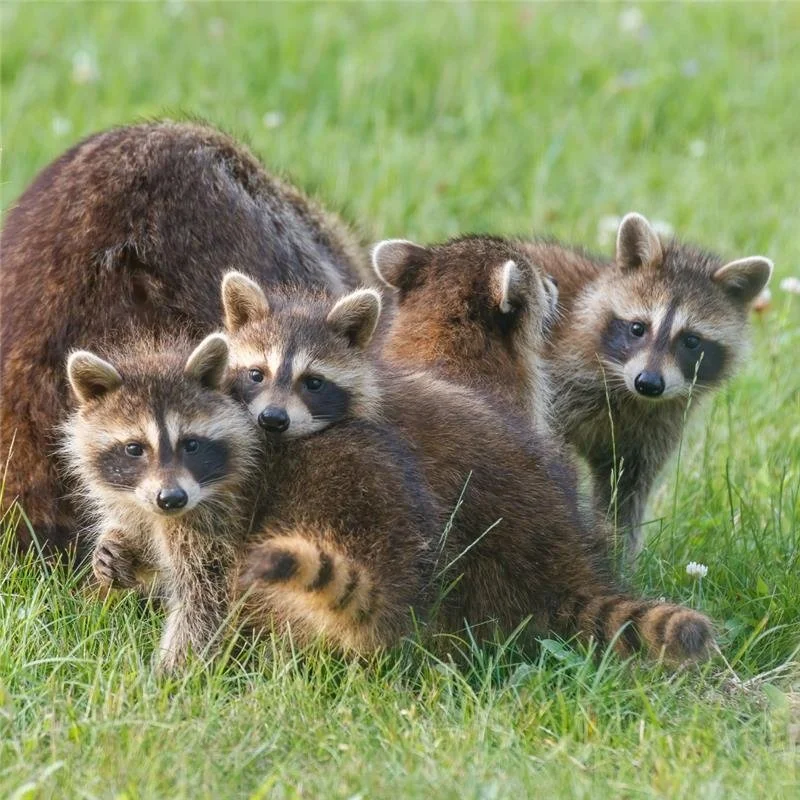State’s annual rabies vaccine bait drop begins Aug. 7
August 3, 2024 | By Waterbury Roundabout Raccoon family photo courtesy the Vermont Department of Health
The state’s annual Rabies Vaccine Bait Drop will begin next week with small packets of rabies vaccine targeted for wildlife being distributed by hand and by aircraft across 10 Vermont counties including Washington County.
The Vermont Health Department announced the program will run Aug. 7-22 in coordination with the Vermont Fish & Wildlife Department and the U.S. Department of Agriculture Wildlife Services to prevent the spread of rabies among wildlife.
So far this year, 44 animals in Vermont have tested positive for rabies — 27 raccoons, nine skunks, seven foxes, and one bobcat. At this time last year, 24 animals tested positive for rabies.
“We’ve seen a significant increase in rabid animals this year, particularly in northern parts of the state, where rabies had largely been under control,” said Dr. Natalie Kwit, state public health veterinarian with the Health Department. “This bait drop will help prevent the spread of rabies among wildlife, protecting the people and domestic animals who may come into contact with them.”
Rabies vaccine in the form of a sweet-smelling oral bait that is attractive to raccoons and skunks will be placed by hand in residential areas and dropped in rural areas from low-flying aircraft, officials explained.
When an animal bites into the bait, it swallows the oral vaccine and will develop immunity to rabies, a deadly viral disease of the brain that infects mammals. Rabies spreads primarily through the bite of an infected animal. In Vermont, rabies is most often found in raccoons, skunks, foxes, and bats. Cats, dogs, and livestock can also get the disease if they have not been vaccinated for rabies.
Approximately 300,000 quarter-sized blister packs containing rabies vaccine will be distributed in Vermont communities across ten counties: Addison, Caledonia, Chittenden, Essex, Franklin, Grand Isle, Lamoille, Orange, Orleans, and Washington. This is the second such drop for Chittenden, Franklin, Lamoille and Grand Isle counties where an earlier one was done in May given the high prevalence of rabies cases in those areas, according to the Health Department.
Rabies bait packs. Click to enlarge. Photos courtesy of Vermont Fish & Wildlife
The bait packs are not poisonous and are not harmful to people, pets or wildlife. If you find a bait pack, leave it alone so it can be eaten by wild animals. The baits are sticky, and human scents left on them may discourage animals from eating the bait. If the bait must be moved, use gloves or a plastic bag. If a pet eats a bait, or if a child brings one home, let officials know by calling the Vermont Rabies Hotline at 1-800-4-RABIES (1-800-472-2437) or call the toll-free number printed on the bait.
According to the Health Department, no bats have tested positive for rabies yet this year, but bat activity typically increases in August and September. If you encounter a bat in your home, call the rabies hotline at 1-800-4-RABIES and get more information about what steps to take at HealthVermont.gov/Rabies#faq
Tips from the experts
Wildlife officials remind people that it is important to leave wildlife alone, especially baby animals. Interacting with young wildlife may result in them being orphaned by their parents, or needing to be tested for rabies, which requires it to be humanely euthanized. The Health Department reports that three young animals — a fox and two raccoons — tested positive for rabies earlier this year.
“You can’t tell whether an animal has rabies simply by looking at it,” said USDA Wildlife Biologist Owen Montgomery. “People should not touch, move, or pick up wild animals or strays – even baby animals that may appear abandoned.”
Other tips from health officials and wildlife biologists:
If you see a sick or strange-behaving wild or stray animal, or if you are concerned about a rabies exposure, call the Vermont Rabies Hotline (1-800-4-RABIES)
Do not touch or pick up wild or stray animals – even baby animals – or try to make them into pets.
If you are bitten by an animal, wash the wound very well with soap and water and contact your health care provider as soon as possible.
If your pet or farm animal was bitten by a wild or stray animal that might have rabies, contact your veterinarian.
Make sure pets and farm animals are up-to-date on their rabies vaccine. State law requires dogs and cats to be vaccinated for rabies — even barn cats.
Always feed pets inside the house and keep them indoors at night. If they are outdoors during the day, keep them on a leash or in an enclosed space. Pets that roam free are more likely to be exposed to rabies.
More information including a list of towns where the bait drop will take place is online on this Rabies Vaccine Bait Drop Fact Sheet and on the Health Department website at HealthVermont.gov/Rabies.



